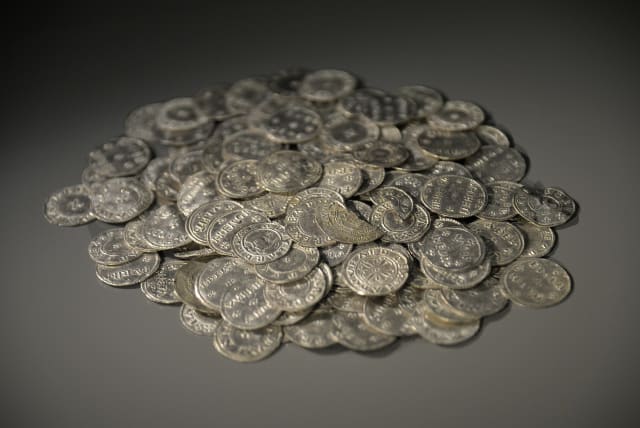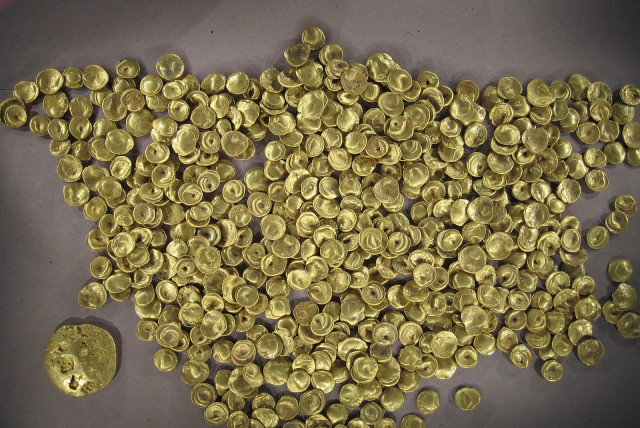Two men arrested after trying to sell Anglo-Saxon coins to undercover police

The coins found in the possession of the two men are believed to have been minted between 874CE and 879CE and issued in both Wessex and Mercia.
A pair of men in the UK have been convicted of attempting to sell rare Anglo-Saxon coins to US collectors, who were actually undercover police.
The men, Roger Pilling, age 74 and Craig Best, age 46, were convicted at a Durham Crown Court after attempting to carry out the illegal sale and are still awaiting sentencing, which will take place on May 4, the Epoch Times reported earlier this week.
The coins found in the possession of the two men are believed to have been minted between 874CE and 879CE and issued in both Wessex and Mercia.
The two were also convicted of possessing criminal property. The judge presiding over the case, James Adkin, said of the pair, "You have both been convicted of what I consider to be compelling evidence of serious criminality, in relation to these artifacts. You are both aware of what the sentence is likely to be, imprisonment for years.”
The men were caught after a sting operation by British police. The police lured Best to a hotel bar in Durham by posing as an interested American collector and coin expert, the National reported.
The police had been alerted after Best reportedly contacted both an American coin expert - who said the coins were fakes - and a British expert in Cambridge. The British expert then informed the police of the incident, who set up the sting operation as a result.
Best brought three coins to the hotel bar for the coin expert to examine, whereupon he was arrested. A further 41 coins were later recovered at Pilling's home in Lancashire, UK.
According to the Guardian, the coins are estimated to be worth £766,000 (or roughly 960,000 USD), with the most expensive being valued at £70,000. Two of the rarest coins found in the collection are known as the "King Alfred two-emperors type silver penny," and prior to 2015, only two other coins of this type had been discovered.
The majority of the coins are the less rare, but still comparatively unique, "cross or lozenge" coins.
The coins are believed to have come from the Herefordshire Hoard, discovered in 2015. The Hoard, which is worth millions of pounds was never declared to the local coroner. Four people have already been convicted for their roles in concealing the discovery.
Why was it illegal for them to keep the coins?
Under the UK Treasure Act 1996, a person who finds a rare coin or prehistoric weapon or tool must report it to the local coroner within 14 days. The Treasure Act defines treasure, in this specific instance, as coins over 300 years old found together with other coins containing precious metals. The finder of treasure must notify the local coroner within 14 days of discovery.
All treasure discovered in the UK is property of the British Crown, meaning that undeclared possession and attempted sales are seen as theft from the Crown. Under the Act, the Crown may provide a reward of up to the market value of the treasure, with the reward being split between the finder and the landowner, as appropriate.
The coins are not just important due to their monetary value but will help historians understand the period better. During this period in history, almost all the written records originate at King Alfred's court.
Alfred's records portray the King of Mercia, Coelwulf, as a puppet of the Vikings, however, these coins shed light on a possible monetary and political alliance between the two.
Viewers of the Netflix show The Last Kingdom, will be familiar with the figures involved in minting these coins and this particular period in English history, and with the Hoard, which is believed to have been buried by a Viking attempting to hide it during this particularly violent time in English history.
Jerusalem Post Store
`; document.getElementById("linkPremium").innerHTML = cont; var divWithLink = document.getElementById("premium-link"); if (divWithLink !== null && divWithLink !== 'undefined') { divWithLink.style.border = "solid 1px #cb0f3e"; divWithLink.style.textAlign = "center"; divWithLink.style.marginBottom = "15px"; divWithLink.style.marginTop = "15px"; divWithLink.style.width = "100%"; divWithLink.style.backgroundColor = "#122952"; divWithLink.style.color = "#ffffff"; divWithLink.style.lineHeight = "1.5"; } } (function (v, i) { });

